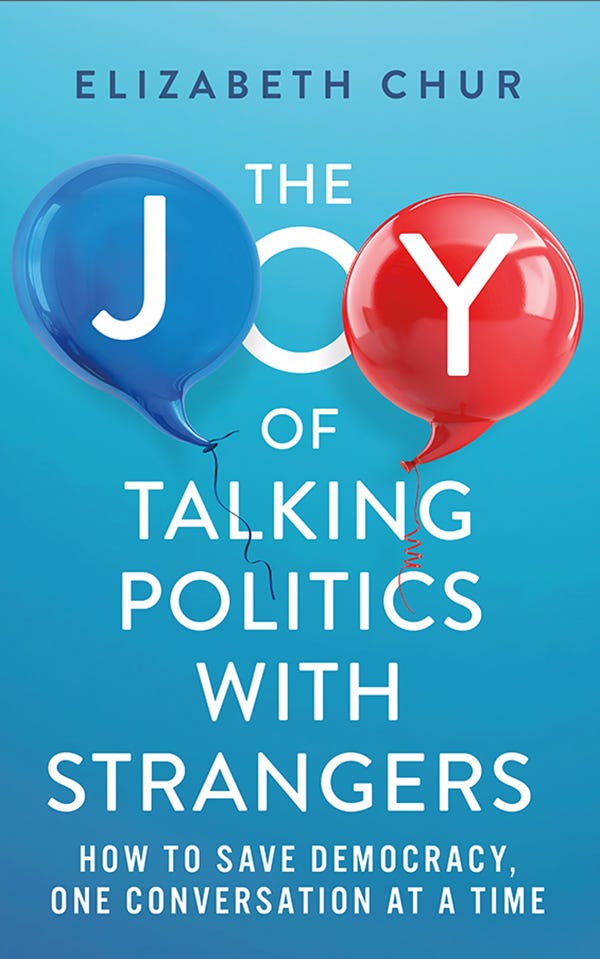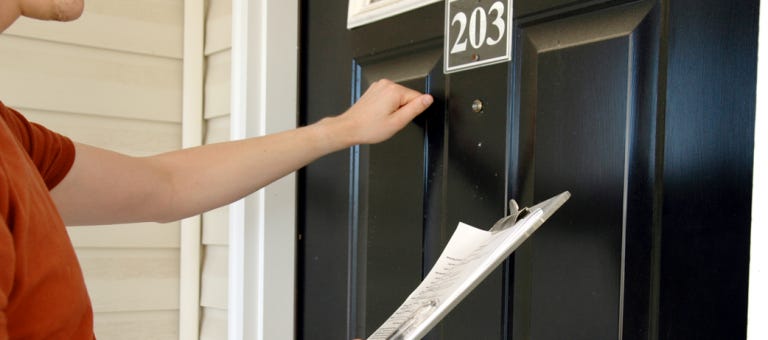One of the most difficult parts of phone banking or canvassing is getting through the first minute of a conversation without the voter hanging up or closing the door. The most important thing is keeping the conversation going long enough to pique their interest and earn their respect.
In addition to the actual words I say, much of what I communicate is conveyed through my tone of voice (and body language, if I’m canvassing). I try to channel respectful warmth from the get-go. I aim for a vibe that’s upbeat, friendly, and relaxed.
I like to introduce myself by saying, “Hi, my name is Elizabeth Chur, and I’m a volunteer with Candidate X.” Then I use one of the following lines:
— “I’m just talking with people in the community about the upcoming elections. I’m curious – what, if anything, have you heard about Candidate X?
— “This is just a two-minute check-in about the upcoming election.”
— “Candidate X wants to make sure she knows what’s most important to people right now. She’s asked us to reach out to every voter in the community to ask – if you could change two or three things about the country, what would they be?”
Sometimes people are eager to talk. But if they’re not, here are some common voter responses, and things I’ve said to keep them talking:
“I hate getting these calls/having people knock on my door!”
(say with empathy and feeling): “I hear you! I’m a shy person, and I’m really uncomfortable talking with strangers. But the upcoming election is so important that I’m going out of my comfort zone to talk with voters about what’s at stake.”
“You’re the third person who’s called/knocked on my door this week!”
(say with an apologetic tone, then genuine curiosity): “I’m so sorry to bother you again. But I didn’t get to hear what you told the other people about (fill in name of Candidate X/issue.) I’m so curious – what are your thoughts about that?”
“I don’t vote.”
(say with nonjudgmental, friendly curiosity): “Oh, interesting! Tell me more about that.” (Side note: I’ve co-created a whole workshop called You and the 34%: How to Have Meaningful Conversations with High-Potential Voters with many more ideas for handling this situation.)
“My vote is private.”
(say calmly, with deference): I totally respect that. (slight pause) Setting aside specific candidates, would you be willing to talk about some of the issues that are most important to you? (If they say yes, you could ask): If you were president, what’s the first thing you’d change?” (This could help you guess their level of support, which you can note in the voter contact app.)
“How do I know you’re telling the truth? There are so many scams out there.”
(sometimes I’ll sigh, then say with empathy): “I know, there are a lot of scams these days, which is a bummer. I’m just a volunteer – I’m not getting paid, and there are 10 things I’d rather be doing. But it’s a hard time in our country, and I figured I’d better step up and do something to make things better. I believe most people are still good folks who want to do the right thing for our country, so that’s why I’m reaching out today.”
Approaches for Navigating Grumpiness
These approaches aren’t always successful in encouraging people to continue the conversation. However, they work a lot better than just barreling on with the canned phone bank or canvassing scripts. There are a few other key elements that increase my success rate:
— Acknowledge their concerns. Instead of ignoring or minimizing what they tell you, I say something that explicitly validates their complaint. Phrases like “I hear you!” and “I totally get that” help demonstrate that I’m truly listening. Using a slightly apologetic tone is a nonverbal but powerful way to communicate that I know their time is valuable. They don’t owe me anything, and they’re doing me a favor by talking with me at all. I’m in their debt, and I try to express my gratitude.
— Empathize. Use words and tone of voice that express solidarity with them, rather than setting up a “me-against-them” dynamic. If they talk about how much they hate getting calls or visits like this, you could say how you normally dislike them, too. That way you’re in the same boat. By quickly pivoting to the reason you’re reaching out, you can shift the focus of the conversation to finding out what’s important to them, and what they’d do to move the country in a better direction.
— Surprise them with sincerity. When people ask if I’m getting paid to make calls or knock doors, I’ve said, “Absolutely not! You couldn’t pay me $100 an hour to do this – it’s way too stressful. I’m only doing this because I’m so worried about the direction of our country.” Maybe they just feel sorry for me, or perhaps their innate desire to be helpful kicks in, but it’s often disarming to say something a paid employee never could.
No approach, no matter how graceful or articulate, is foolproof. I try to lower my expectations, accept that some people won’t talk no matter what I do, and allow myself the freedom to experiment with different approaches. If any of them keeps even 10% more voters engaged, that could make the difference between winning and losing. So give yourself permission to try out different things, and share your best tips in the Comments below!
Elizabeth Chur has trained more than 2,500 volunteers through three workshops: Phone Bank and Canvassing Training for Introverts (& Friends), Spanish for Activists, and You and the 34%: How to Have Meaningful Conversations with High-Potential Voters. This post is adapted from her new book, The Joy of Talking Politics with Strangers: How to Save Democracy, One Conversation at a Time.








Her book, “The Joy of Talking Politics to Strangers: How to Save Democracy, One Conversation at a Time" is a must read.
Elizabeth was on the Friday Power Lunch podcast last week and delivered a fabulous overview of her book. Check it out. You'll be glad you did. Her stories help you understand that talking to strangers can be fun and rewarding, even for introverts.
https://youtu.be/XztOMF2Z18o?si=1Awsln0y9MfrRz_9&t=526
Thank you so much for your thoughtful comment and observations. Yes, it often feels like I'm trying to pry information out of a sullen teenager! But if they're still talking to you (even in monosyllabic responses), that's a plus - they haven't shut the door in your face or hung up on you yet.
One suggestion would be to rephrase some of your questions below as open-ended questions (can't be answered with "yes/no") vs. closed-ended.
So for example, instead of “Have you thought about (candidate)‘s race and about what’s important to you?” you could try one of these:
"What, if anything, have you heard about Candidate X?"
"I'm curious - if you were in an elevator for one minute with the President/Candidate X, what would you tell him/her?"
"If you were in charge of the country, what 2 or 3 things would you change?" (Listen intently, then ask some follow-up questions, such as). "If that happened, how would your life be better/different?"
Sometimes, especially for young people or men, I think there's a reluctance to admit that anything is less than great. Perhaps there's a shame in losing face, especially with a stranger. If they say everything is fine and they wouldn't change anything, one tactic you could experiment with is:
"I'm really glad to hear things are going well with you. (slight pause) I'm curious, if you could change anything to make life better for your *family or friends,* what would it be?"
The most helpful thing for me has been bringing nonjudgmental curiosity to the conversation. I really want to know more about their lives, what's challenging, what their goals are for themselves and their family, what keeps them up at night.
It can also be helpful to me personally to reframe the idea of "low-information" voters and instead, approach them as experts in their own lives and what's important to them. Seek their expertise, and learn more about the details of their lives and their pain points. It's my job as a canvasser or phone banker to try to find out more about what they care about. I might ask three or four open-ended questions before landing on one that seems to open the door to more detailed responses.
Here's a story from my book from Chapter 5: "80% Them, 20% Me":
When trying to elicit information from a taciturn voter, I sometimes feel like I’m a safecracker trying to open a combination lock. There can be a lot of trial and error, and it’s important to take my time and pay attention to subtle details. I try to act like I have all the time in the world, and to home in on any cues that indicate a voter might have more to say about a particular topic.
For example, I talked with a college student I’ll call Elena. A couple of weeks before the election she was still undecided about how she’d be voting, and said she needed to do more research. When I asked her, “If you were the president, what two or three things would you change about the country?” she couldn’t think of anything. When I asked, “If you were in an elevator with the president for two minutes, what would you ask him to change?” she drew a blank.
But then when I asked her, “How would Biden’s student loan program make a difference in your life?” she told me how she left her house at 5:20 a.m. to work all day harvesting grapes, getting home in the afternoon for a quick shower before going to evening classes, then coming home, eating dinner, studying a little, and crashing, only to get up and do it all over again the next day. She didn’t want to get her textbooks dirty in the fields, so she took photos of a few pages using her phone, then tried to read them during her work breaks. She said how it was hard to really focus on her classes and absorb the concepts because her study time was so fragmented.
She hadn’t been able to think of anything she’d change at the start of our conversation. However, once we started talking about how lower tuition costs would make her life better, it turned out she had lots of opinions. That led naturally to a discussion about why it was so important to elect Democrats in the upcoming election.